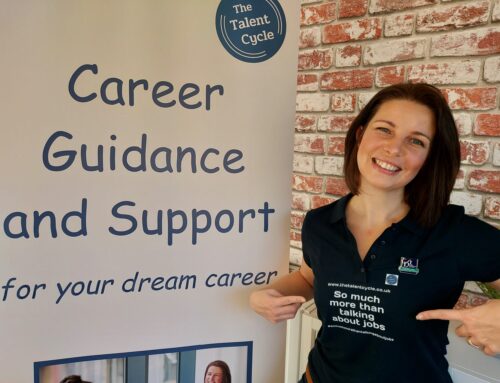Chris Webb explores where our career role models come from, why they matter and how they are sometimes much closer than we think…

In November 2021, a touching moment that took place during the ‘An Audience with Adele’ ITV special went viral across both social and mainstream media. However, it wasn’t concerning the release of Adele’s new album but rather an onstage reunion with an English teacher who had inspired her growing up and who she had not seen in over 20 years (1). In addition to fostering her passion for language, the words that Adele used to describe Ms. McDonald, her secondary school English teacher, will resonate with any of us who have ever had a similar role model figure in our lives – “She was so bloody cool. So engaging… She really made us care, and we knew that she cared about us.” (1) Evidently, role models can have a significant impact on our careers, particularly from a young age – but what does a career role model look like and why are they so important from a careers education perspective?
‘You can’t be what you can’t see’ – Representation matters. The surge in sign-ups for British Sign Language classes following Rose Ayling-Ellis’ inspiring victory on Strictly Come Dancing in December 2021 (2) is just one high-profile example of the importance of having career role models who look and sound like us, whatever our background. Of course, representation is most effective when it involves a diverse range of professionals telling their own stories in an authentic way and this is something that sites like Day of Wrk, which serves as a platform to champion ethnic minorities and support disadvantaged individuals with career exploration, strive to provide. This is particularly vital in industries which suffer from a lack of diversity and where organisations like AFBE-UK (the Association for Black and Minority Ethnic Engineers) and Code First Girls play a key role in outreach and advocacy, as well as providing a wealth of career role models.
‘You can’t be what you don’t understand’ – Of course, when it comes to career role models it’s not just about knowing that certain pathways exist, it’s also about knowing what you might need to do to get there. This goes beyond job profiles and overviews of required qualifications and work experience to encompass the behaviours, skills and values that a young person might need to develop if they wish to follow a particular career pathway. Storytelling plays a vital role here, with industry volunteers from organisations like STEM Ambassadors, Inspiring the Future or Speakers for Schools able to authentically provide a ‘warts and all’ overview of different job roles and the paths they took to get there, whether via an apprenticeship, college course, university degree or other training route. This sort of work is also happening on a local level around the country, through initiatives like the Local Enterprise Partnership’s Enterprise Adviser Network or the ‘See It, Be It’ YouTube channel, set up by Sheffield City Council (in partnership with the Sheffield City Region Enterprise Adviser Network and the European Social Fund), which aim to demystify different career pathways for young people and help them develop a greater understanding of what they might need to do to follow these pathways themselves.
‘You can be…’ – The final piece of the puzzle that career role models contribute is in giving young people permission to imagine new career possibilities. We know from the recent Education and Employers ‘Starting Early’ report (3) that aspirations about education and work can be formed as young as the age of 5 and that career ambitions are often persistent from primary-age all the way up to post-16. Giving children from primary school upwards access to career role models allows them to explore a diverse range of career pathways and imagine themselves in a multitude of scenarios, rather than what they might be exposed to naturally, which could quite easily vary based on the background of the individual.
As noted above, there are currently a plethora of websites, organisations and initiatives focused on highlighting career role models for young people, ranging from broad (such as iCould) to industry specific (such as Careers in Sport), all of which use real professionals to inspire and educate about different career pathways. But these industry volunteers are only part of the career role model equation – for many of us, our career role models are much closer than we think! They are the individuals we spend the most time with in our formative years – our friends, family, peers and other significant figures in our lives, such as teachers, educational support workers and sports coaches, to name just a few.
As careers educators, it is integral that we highlight the importance of these career role models as well as using more industry-focused or high-profile examples. There are many ways that we can do this, for example using the ‘Job/Career of the Week’ profile in a school careers newsletter to include interviews with parents/carers/school staff about their career pathways to date – this can be an untapped font of valuable careers inspiration, particularly in terms of engaging young people in conversations regarding non-linear career pathways. Showcasing career role models who have taken the path less travelled (for example, studying in one field and then moving on to do something totally different in the future) helps to demonstrate the value of career management skills, such as effective decision-making and being prepared for change, alongside some of the lessons we more typically recognise as coming from career role models, such as ‘passion for a subject’, ‘determination to succeed’ or ‘developing a better understanding about a specific career pathway’.
As many of us will have already discovered during our own lives, career role models come in various forms – I believe it is incumbent upon those of us working in the careers sector to ensure that young people are exposed to as many potential career role models as possible and that we acknowledge the vital part that all career role models can play in an individual’s career journey, from high-profile success stories to the consistent ‘cheerleader’ in a young person’s life.
References:
- Global News – Adele cries tears of joy as she reunites with long-lost teacher: https://globalnews.ca/news/8392765/adele-teacher-reunion/
- BBC News – Rose Ayling-Ellis: Strictly star inspires sign language lessons surge: https://www.bbc.co.uk/news/newsbeat-59474819
- Education and Employers – Starting Early: Building the foundations for success: https://www.educationandemployers.org/startingearly/
Chris Webb RCDP is a Higher Education Careers Professional, Freelance Careers Writer and Co-Host of the Career Development Institute’s #WeAreCareers live-stream show on Facebook, LinkedIn and YouTube. He is also a member of the Association of Graduate Careers Advisory Services (AGCAS) and the Career Writers’ Association. You can connect with Chris via his professional LinkedIn (linkedin.com/in/christopherwebbuk/) and Twitter (@WorldWebb) accounts.





